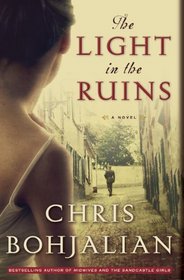Helpful Score: 2
Review first posted on my blog: http://memoriesfrombooks.blogspot.com/2013/10/the-light-in-ruins.html
The Light in the Ruins is a story of World War II as it comes to Italy and a story of a war vendetta carried out about ten year later. The story moves back and forth between the two time periods, slowly revealing bits and pieces about the characters and the events that transpired.
The story centers around the Rosati family. During the war, the Rosatis live on their estate, the Villa Chimera near Florence. Two brothers, Vittore and Marco, serve in the war. Eighteen year old Cristina, along with her parents and Marco's wife and children, live at Villa Chimera. The hope is that the war will end before it truly reaches them. Unfortunately, that is not to be. Italy becomes a battleground, as the Allies reach near, Germany makes a stand, and the Italian partisans fight in the nearby hills. The Rosatis are caught up in the fighting, becoming host to both the Nazis and the partisans.
Ten years later, Francesca, Marco's wife is found brutally murdered in Florence. The police investigate. One of the investigators, Serafina Bettina, was one of the partisans during the war and discovers her own link to the Rosatis.
The book continues with the story from both time periods. Interspersed throughout the thoughts or words of the killer, possibly to provide hints as to the killer's identity and motive. The suspense builds in both time periods throughout the book as the killings and the investigation continue, and as the war comes closer and touches Villa Chimera. Chris Bohjalian's writing brings both time periods and the characters to life.
Most of Chris Bohjalian's books have an unexpected ending, one that makes you look back through the book to see if you could have seen it coming. With this book, the unfortunate thing is that you could not have seen it coming. The ending and the resolution was almost tangential to the main story built throughout the book. As a reader, that takes some of the fun out of it. It's one thing to be surprised. It's quite another to feel that it was almost unrelated. Still, the writing is enjoyable.
The Light in the Ruins is a story of World War II as it comes to Italy and a story of a war vendetta carried out about ten year later. The story moves back and forth between the two time periods, slowly revealing bits and pieces about the characters and the events that transpired.
The story centers around the Rosati family. During the war, the Rosatis live on their estate, the Villa Chimera near Florence. Two brothers, Vittore and Marco, serve in the war. Eighteen year old Cristina, along with her parents and Marco's wife and children, live at Villa Chimera. The hope is that the war will end before it truly reaches them. Unfortunately, that is not to be. Italy becomes a battleground, as the Allies reach near, Germany makes a stand, and the Italian partisans fight in the nearby hills. The Rosatis are caught up in the fighting, becoming host to both the Nazis and the partisans.
Ten years later, Francesca, Marco's wife is found brutally murdered in Florence. The police investigate. One of the investigators, Serafina Bettina, was one of the partisans during the war and discovers her own link to the Rosatis.
The book continues with the story from both time periods. Interspersed throughout the thoughts or words of the killer, possibly to provide hints as to the killer's identity and motive. The suspense builds in both time periods throughout the book as the killings and the investigation continue, and as the war comes closer and touches Villa Chimera. Chris Bohjalian's writing brings both time periods and the characters to life.
Most of Chris Bohjalian's books have an unexpected ending, one that makes you look back through the book to see if you could have seen it coming. With this book, the unfortunate thing is that you could not have seen it coming. The ending and the resolution was almost tangential to the main story built throughout the book. As a reader, that takes some of the fun out of it. It's one thing to be surprised. It's quite another to feel that it was almost unrelated. Still, the writing is enjoyable.





